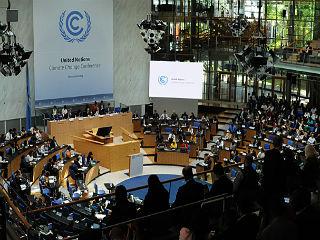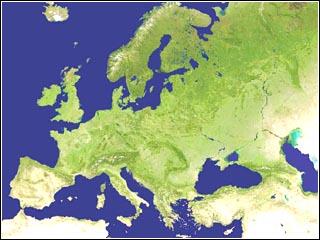
Why the fake news bomb has exploded
By: EBR | Friday, November 17, 2017
We are just out of the field on a flash poll in the U.S. taken last week, with 1,000 members of the general population and an oversample of 113 Silicon Valley-based tech employees on the impact of fake news on trust in mainstream media

Why wisdom can’t be taught?
By: EBR | Thursday, November 16, 2017
In the pursuit of wisdom, executives may find themselves taking off their masks to become truly authentic and reflective leaders

COP23 in search of a leader
By: EBR | Thursday, November 16, 2017
Between coal-addicted Germany, France with its ideas but dearth of new commitments, and the EU entangled in its contradictions, the political weight of the COP23 turned out lighter than expected. EURACTIV France reports

Cyber security at civil nuclear facilities – understanding the risks
By: EBR | Thursday, November 16, 2017
Recent high-profile cyber attacks, including the deployment of the sophisticated 2010 Stuxnet worm, have raised new concerns about the cyber security vulnerabilities of nuclear facilities

How Academics Can Rebuild Trust in Science
By: EBR | Thursday, November 16, 2017
The tools for overcoming declining trust in science lie in science itself

Learning in the digital age: is Greece enough capable and to what extend can follow the digital learning developments?
By: EBR | Thursday, November 16, 2017
There may be difficulties in accepting the digitization of services such as taxi in our country, but the civilized world continues the evolutionary race

Greece: step back to the past?
By: N. Peter Kramer | Tuesday, November 14, 2017
In his first speech to the SYRIZA parliamentary group since the summer, Prime Minister Alexis Tsipras stepped up his effort to put distance between SYRIZA and New Democracy in voters’ minds in what many see as a pre-cursor for the political battle to come in Greece over the coming months

Paradise Papers is an ‘opportunity’ for EU to tackle multinational tax evasion, says Greek MEP
By: EBR | Tuesday, November 14, 2017
The Paradise Papers has presented the EU with a golden opportunity to crack down on tax evasion by multinationals and the art of investing profits from cheap labour in tax havens practised by emerging economies, insists European Parliament Vice-President Dimitris Papadimoulis

5 issues that will shape the future, according to the experts
By: EBR | Monday, November 13, 2017
Our future’s bright: new technology promises solutions to the world’s biggest problems. But the future’s also frightening: accelerating change is disrupting every aspect of life

After Paradise Papers, it is high time for the EU to act
By: EBR | Monday, November 13, 2017
The Paradise Papers showed once again that anonymous companies are being used as a 'getaway vehicle' for criminality

Governments: the next heroes of innovation
By: EBR | Monday, November 13, 2017
As the world’s biggest buyers of goods and services, governments can play a starring role in the pursuit of knowledge-economy reforms

Why culture matters: fostering identity through cultural heritage
By: EBR | Monday, November 13, 2017
A museum director’s reflections on vexing global issues such as identity, tolerance, conflict and war

Your Guide To Chinese Social Media
By: EBR | Sunday, November 12, 2017
It's not just WeChat and Weibo

Changing climate, shifting policies
By: EBR | Thursday, November 9, 2017
Just a few months ago, the World Bank did something remarkable. It recommended open-access migration to Australia and New Zealand for populations of Small Island States in the Pacific that will be most affected by climate change

Life in 2030: these are the 4 things experts can’t predict
By: EBR | Thursday, November 9, 2017
Alvin Toffler predicted a future in his 1970 bestseller Future Shock that looks much like today’s reality

What if imagination turns into reality
By: EBR | Wednesday, November 8, 2017
The new generation of quantum computers is called to cause a radical revolution in each field of knowledge

5 predictions for what life will be like in 2030
By: EBR | Tuesday, November 7, 2017
You are just waking up in the spring of 2030. Your Internet of Things bedroom opens solar powered e-windows and plays gentle music while your smart lighting displays a montage of beachfront sunrises from your recent vacation

Climate Action brings the private sector to COP23
By: EBR | Tuesday, November 7, 2017
The Paris Agreement set out principles, but not the details of implementation, meaning that the Bonn meeting will be vital in building the rules that will enable the Paris goals

Five things that will be top of the agenda at the COP23 climate summit
By: EBR | Tuesday, November 7, 2017
The United Nations' Climate Change Conference kicked off in Bonn today, formally called the 23rd Conference of the Parties (COP23)

We need to talk about climate refugees
By: EBR | Tuesday, November 7, 2017
Climate change is not just about polar bears, it is about all life on our planet, and it poses a threat to humanity as great – or greater – than war or terrorism. Steve Trent warns that climate change is increasingly viewed as a threat to global peace



 By: N. Peter Kramer
By: N. Peter Kramer
